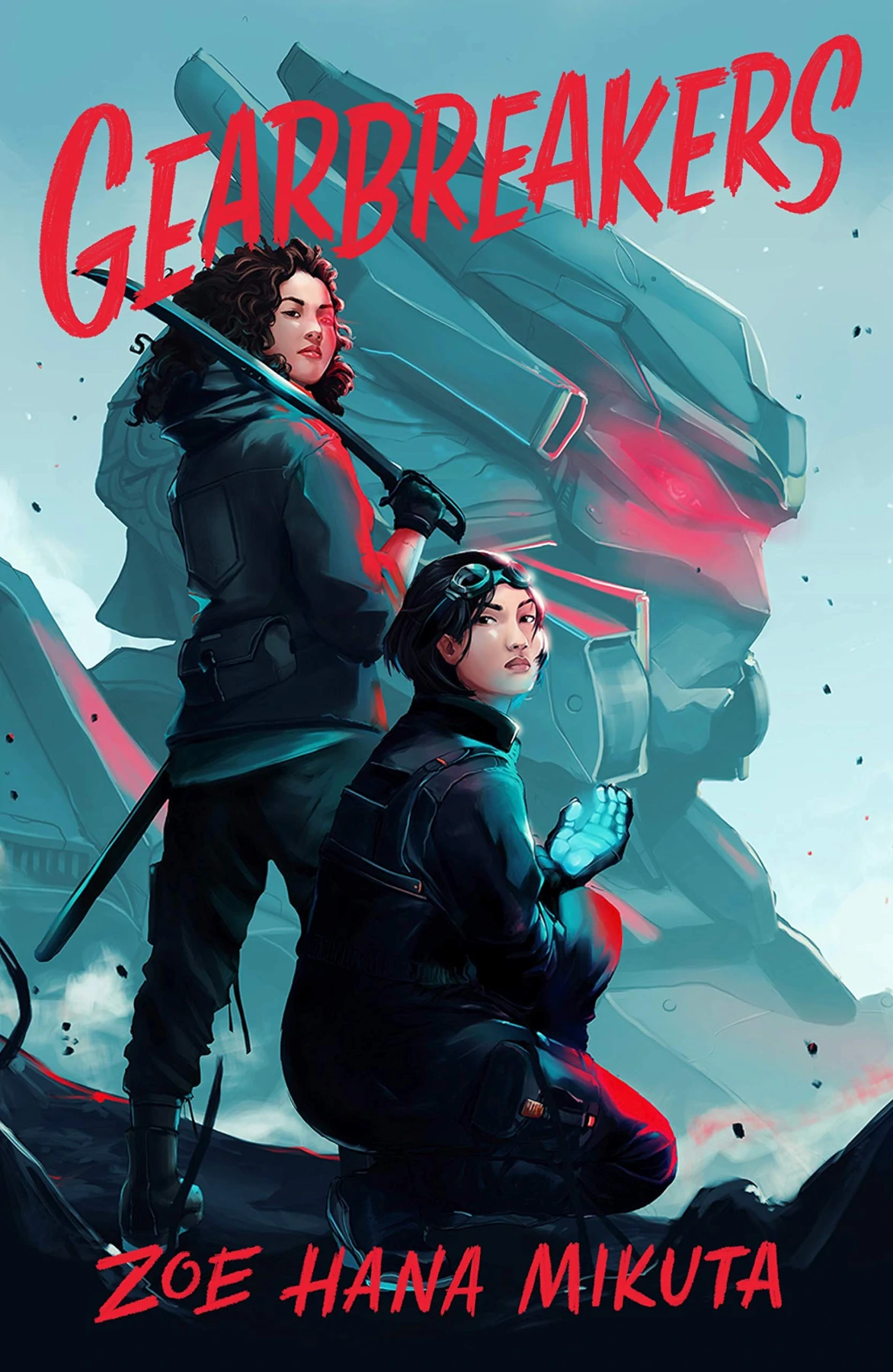
A Review of Gearbreakers by Zoe Hana Mikuta
Words By Emily Brill-Holland
Spoiler Warning!: This review contains extensive spoilers for Zoe Hana Mikuta’s novel, Gearbreakers.
Published June 29, 2021 by Feiwel & Friends.
“[W]hen the times were desperate enough, when the people were frenzied enough, at a certain point we went past praying to deities and started to build them instead.”
In that opening sentence, Mikuta winds us into the world of Gearbreakers. Godolia, the capital city as well as the nation’s namesake, reigns tyrannical and terrifying, across everywhere their mechas can reach. The 200-foot-tall robot enforcers, known as Wind-Ups, and their pilots annex surrounding populations, ruthlessly converting them into resource towns. They’re hindered only by the boundaries of the continent itself. The Badlands, where nomads eke out a living, is the only place left untapped.
Sona Steelcrest is a Pilot with revenge clenched between her teeth. The book begins on her first day waking up as a Modded Pilot at the astonishing age of seventeen. Sona, we learn quickly, has no intention of being Godolia’s tool; instead she is here to bring it down from the inside.
Meanwhile, Eris Shindanai is a Gearbreaker. Based in a rebel hideout in the Badlands and feral-teen captain to a crew of even younger, even more feral teens, Eris’s life revolves around the adrenaline rush of bringing the giant Wind-Ups down. When a mission goes wrong, Eris finds herself captured by a mecha and imprisoned in the Wind-Up headquarters. Until Sona proposes an alliance to escape.
Told in alternating POVs between Sona and Eris, the voices of the two girls could very easily have blurred. Their romance is built on the common ground of rage and twin desires for revenge and vengeance. However, I thought the two POVs were cleverly separated by Mikuta.
It wasn’t love at first sight; it was an instant lightning bolt of look at the girl laugh in the face of death like it doesn’t fucking matter, which morphed into the softer mutual respect of let’s destroy our common enemy together because you’re just as filled with fury as I am. And then quietly became only you truly see me. Unfortunately, I didn’t believe the love story; the foundations of the romance aren’t laid before the house is built. Their love moved supremely slowly and then swiftly in directions I didn’t feel made sense for the characters in the moment.
The world-building was excellent though. I loved the unit structure of the Academy and the Pilots. Some of my favorite moments were when Mikuta had a piece of tech operate casually, naturally embedded in the world; she’d name the object in a throw-away line and then a few paragraphs later, use it—world-building at its finest. I loved the feral, death-defying, fate-defying nature of the Gearbreakers; of Sona who refused, in her own way, the destiny being prescribed to her.
However, readers should know this book starts slow. The first 20 percent of the novel is hefty world-building and tonally a lot of rage. Sona’s grief-stricken, rage-stricken POV is a lot of the first quarter of the story and Mikuta’s metaphors are lengthy; there were several sentences that I had to re-read several times that I feel an editor could have pared back, while still preserving the voice difference between Sona and Eris. A lot of the book relied on this anger and grief that is propelling these two characters forward, and some readers could find it overly repetitive.
I am a sucker for found-family tropes but struggled to engage with the scenes that involved Eris’ unit, as the feral nature shifted from moments of believability when I cheered, to moments when I wondered if anyone would actually do that. I also felt that rather than being three-dimensional characters, they were more of a one-note flavor that threaded through the book, which meant that when a member of Eris’s unit dies, it didn’t impact me in the way that I would have expected it to.
This was possibly affected by the pacing, which I also struggled with. I may just have had different expectations as to what the plot would be like, or what kind of story was being told. While nearing the climax of the novel, the story pauses for a few moments and Mikuta takes time to further develop the romance, and the tension that had been building to a conclusion dissipates.
If you’re looking for a kick-ass sci-fi dystopia ruled by massive mechas and two scrappy girls determined to pilot their own destinies, come hell or high water, this is a book for you! I am looking forward to the sequel, and for anything Mikuta writes in the future. Her world is an interesting one, and I look forward to her further developing her craft.